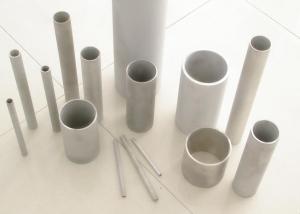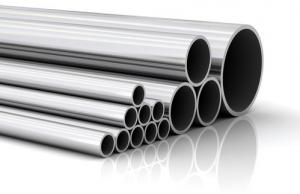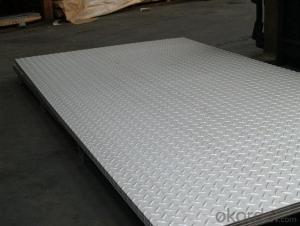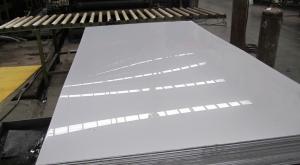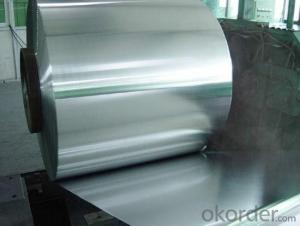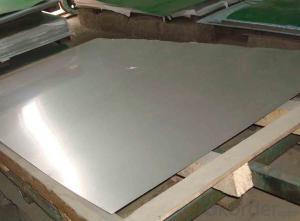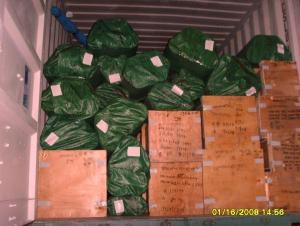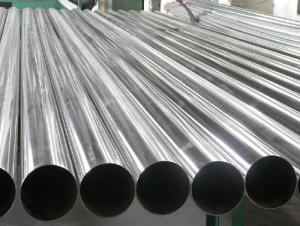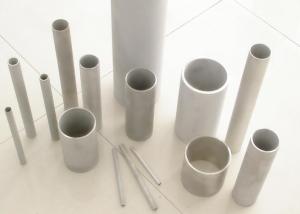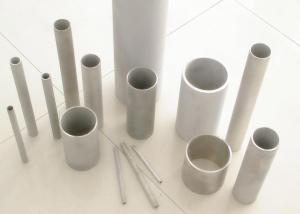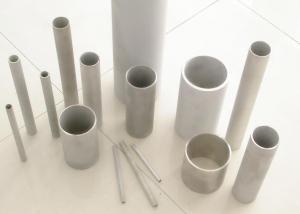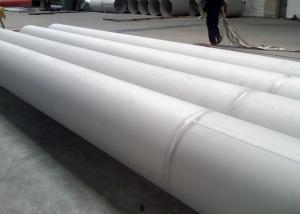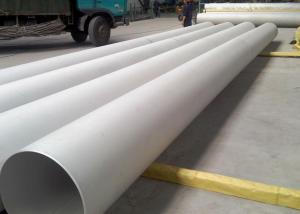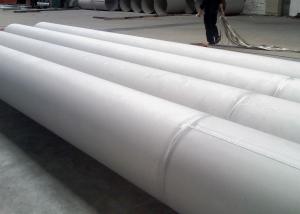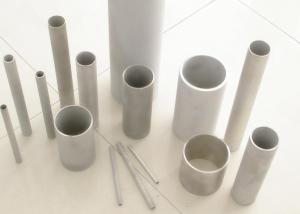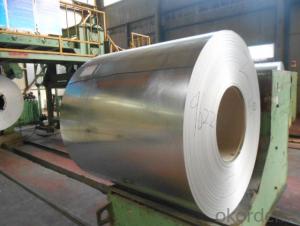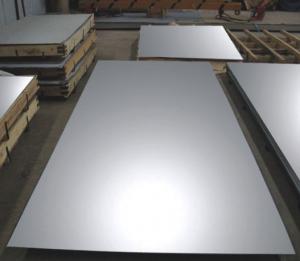Stainless Steel Coil 304
- Loading Port:
- China Main Port
- Payment Terms:
- TT OR LC
- Min Order Qty:
- -
- Supply Capability:
- -
OKorder Service Pledge
Quality Product, Order Online Tracking, Timely Delivery
OKorder Financial Service
Credit Rating, Credit Services, Credit Purchasing
You Might Also Like
Stainless Steel Coil 304
1.Thickness:0.4mm-80mm
2. Width:1000mm-1500mm
3. Price:1000USD-4500USD
Size(in mm) | 1000*2000,1220*2440,1250*2500,1500*3000,1500*6000 Or as customer’s requirement |
Thickness(mm) | 0.4-80 |
Specification | A240 |
Grade | 430,409,420,201,202,304,304L,316L,310S, 309and so on |
Certificate | Manufacturer Test Certificate, Laboratory Test Certificate |
Standard | ASTM,GB,JIS, |
Surface | 2B,BA,Mirror,Hair Line,No.4+PVC |
Technique | Cold rolled and hot rolled |
MOQ | 1 ton |
Supply Ability | 1000 tons/month |
Terms of payment | TT or LC |
- Q:How do you prevent chloride-induced corrosion in stainless steel sheets?
- To prevent chloride-induced corrosion in stainless steel sheets, there are several measures that can be taken: 1. Material selection: Choosing the right grade of stainless steel that is resistant to chloride corrosion is crucial. Grades such as 316 or 317 are particularly effective in resisting chloride attack. 2. Surface treatment: Applying a passivation treatment to the stainless steel sheets can help enhance their resistance to chloride-induced corrosion. Passivation removes any surface iron contamination that may have occurred during fabrication, restoring the protective oxide layer. 3. Proper cleaning: Regular cleaning of the stainless steel sheets is essential to remove any chloride-containing contaminants that may have built up on the surface. Chloride ions can accumulate from saltwater, cleaning products, or other sources, so it is important to maintain a clean surface. 4. Avoid contact with chloride-containing substances: Minimizing exposure to chloride-containing substances can greatly reduce the risk of corrosion. This includes avoiding direct contact with saltwater, chloride-based cleaning agents, and chloride-rich environments such as swimming pools or coastal areas. 5. Design considerations: In environments where chloride exposure is expected, proper design considerations can help prevent corrosion. This may involve using protective coatings, minimizing crevices or gaps where chlorides can accumulate, and ensuring proper drainage to avoid stagnant conditions. 6. Regular maintenance: Regular inspections and maintenance of the stainless steel sheets can help identify and address any potential corrosion issues before they become severe. This may include repairing any surface damage, reapplying passivation treatments if necessary, and maintaining a clean surface. By following these preventive measures, the risk of chloride-induced corrosion in stainless steel sheets can be significantly reduced, ensuring their long-term durability and performance.
- Q:Can stainless steel sheets be used in industrial applications?
- Yes, stainless steel sheets can definitely be used in a wide range of industrial applications. Stainless steel is known for its excellent corrosion resistance, durability, and strength, making it ideal for various industrial environments. It is commonly used in sectors such as automotive, aerospace, construction, manufacturing, food and beverage, chemical processing, and many others. Stainless steel sheets are often used for their ability to withstand high temperatures, harsh chemicals, and extreme conditions. They can be fabricated into different shapes and sizes, making them suitable for a wide range of applications. Stainless steel sheets are commonly used for manufacturing equipment and machinery, storage tanks, pipelines, architectural structures, and as a protective layer on surfaces that require resistance to corrosion. Furthermore, stainless steel sheets offer hygienic properties, making them suitable for applications in the food and beverage industry. They are easy to clean, maintain, and sterilize, ensuring compliance with strict industry standards. In summary, stainless steel sheets are versatile and reliable materials that can be effectively used in various industrial applications due to their exceptional corrosion resistance, durability, strength, and hygienic properties.
- Q:How do stainless steel sheets differ from other types of metal sheets?
- There are several ways in which stainless steel sheets are different from other types of metal sheets. To begin with, stainless steel is an alloy that contains at least 10.5% chromium. This chromium content creates a protective layer of chromium oxide on the metal's surface, giving it a high resistance to corrosion and staining. This sets stainless steel sheets apart from other metals as they can endure exposure to harsh environments, chemicals, and moisture without deteriorating. Additionally, stainless steel sheets provide excellent strength and durability. Due to their composition, they are highly resistant to heat, impact, and wear. This makes them suitable for a wide range of applications, including automotive, construction, and industrial settings, where strength and endurance are crucial. Another significant difference is the aesthetic appeal of stainless steel sheets. They have a modern and sleek appearance that is highly sought after in architectural and interior design projects. Stainless steel sheets can be easily polished to achieve a mirror-like finish, adding an elegant touch to any space. Furthermore, stainless steel sheets are known for their hygiene and cleanliness. They have a non-porous surface that does not absorb moisture, making them resistant to bacteria, mold, and other contaminants. This makes stainless steel sheets the preferred material for kitchen appliances, food processing equipment, and medical devices. Lastly, stainless steel sheets offer high levels of customization. They can be manufactured in various thicknesses, sizes, and finishes to meet specific requirements. Additionally, stainless steel can be easily formed, welded, and fabricated, allowing for creative designs and customization options. In conclusion, stainless steel sheets stand apart from other metal sheets due to their exceptional corrosion resistance, strength, durability, aesthetic appeal, hygiene, and customization options. These unique characteristics make stainless steel sheets a versatile and reliable choice for a wide range of applications.
- Q:Can stainless steel sheets be used for automotive exhaust systems?
- Indeed, automotive exhaust systems can utilize stainless steel sheets. The use of stainless steel is prevalent in exhaust systems owing to its remarkable resistance to corrosion, ability to withstand high temperatures, and durability. It successfully endures the harsh conditions present in exhaust systems, encompassing intense heat, moisture, and chemicals. Stainless steel sheets can be shaped and manufactured into diverse components of the exhaust system, including pipes, mufflers, and catalytic converters. They offer enduring performance, minimize the likelihood of rust and corrosion, and enhance the overall efficiency and longevity of the automotive exhaust system.
- Q:What's the difference between cold rolling and hot rolling of stainless steel plate?
- Cold rolling and hot rolling are different processes, and cold rolling is usually made by longitudinal rolling. Cold rolling process usually includes preparation of raw materials, pickling, rolling, degreasing, annealing (heat treatment), finishing and so on. Cold rolling takes hot rolling product as raw material, and the raw material should be removed before cold rolling so as to ensure the surface cleanness of cold rolling products.
- Q:What is the impact strength of stainless steel sheets?
- The impact strength of stainless steel sheets may vary based on several factors, including the grade and thickness of the stainless steel and the specific conditions under which the impact occurs. Stainless steel possesses inherent properties that contribute to its good level of impact strength, such as high tensile strength and ductility. Stainless steel is renowned for its ability to endure impacts and resist deformation, making it a favored material in industries where durability is crucial. It demonstrates exceptional resistance to impact loading, enabling it to withstand sudden impact forces without fracturing or breaking. Consequently, stainless steel sheets are well-suited for applications that demand high impact resistance, such as structural components, automotive parts, and machinery. Nevertheless, it is important to note that impact strengths may differ among various grades of stainless steel. Austenitic stainless steels (e.g., 304 and 316), for instance, exhibit excellent impact resistance due to their elevated nickel and chromium content. Conversely, ferritic and martensitic stainless steels may possess slightly lower impact strengths. Moreover, the thickness of the stainless steel sheet also influences its impact strength. Thicker sheets generally offer greater impact resistance compared to thinner ones, as they can absorb more energy before yielding or fracturing. It is worth mentioning that the impact strength of stainless steel can be further improved through additional methods, such as heat treatment and alloying. These processes enhance the material's toughness and resistance to impact loading. In conclusion, stainless steel sheets possess favorable impact strength that suits many applications. However, it is advisable to consult specific grade and thickness specifications, as well as any relevant industry standards or regulations, to determine the precise impact strength requirements for a particular application.
- Q:Are stainless steel sheets non-magnetic?
- Stainless steel sheets are not inherently non-magnetic, contrary to popular belief. Although there are varieties of stainless steel, like austenitic grades such as 304 and 316, that are non-magnetic, there are many other types that can possess magnetic properties. It is worth noting that ferritic and martensitic stainless steels, in particular, tend to exhibit magnetism. The presence or absence of magnetism in stainless steel is determined by its composition and crystal structure. Therefore, if your requirement is specifically for non-magnetic stainless steel sheets, it is advisable to choose the austenitic grades.
- Q:Can stainless steel sheets be used for elevator frames?
- Yes, stainless steel sheets can be used for elevator frames. Stainless steel is known for its durability, strength, and resistance to corrosion, making it an ideal material for various applications, including elevator frames. The use of stainless steel sheets for elevator frames ensures a long-lasting and aesthetically pleasing structure that can withstand the wear and tear of everyday use. Additionally, stainless steel's sleek and modern appearance can enhance the overall design of the elevator, providing a sophisticated and stylish look.
- Q:Can stainless steel sheets be used for electrical or electronic applications?
- Yes, stainless steel sheets can be used for electrical or electronic applications. Stainless steel has excellent corrosion resistance and high temperature resistance, making it suitable for various electrical and electronic components like enclosures, connectors, and circuit boards. Additionally, it offers good mechanical strength and can provide electromagnetic shielding in certain applications.
- Q:What is the price per square foot for stainless steel sheets?
- The price per square foot for stainless steel sheets can vary depending on factors such as thickness, grade, and quantity. It is recommended to contact suppliers or check their websites for the most accurate and up-to-date pricing information.
1. Manufacturer Overview |
|
|---|---|
| Location | |
| Year Established | |
| Annual Output Value | |
| Main Markets | |
| Company Certifications | |
2. Manufacturer Certificates |
|
|---|---|
| a) Certification Name | |
| Range | |
| Reference | |
| Validity Period | |
3. Manufacturer Capability |
|
|---|---|
| a)Trade Capacity | |
| Nearest Port | |
| Export Percentage | |
| No.of Employees in Trade Department | |
| Language Spoken: | |
| b)Factory Information | |
| Factory Size: | |
| No. of Production Lines | |
| Contract Manufacturing | |
| Product Price Range | |
Send your message to us
Stainless Steel Coil 304
- Loading Port:
- China Main Port
- Payment Terms:
- TT OR LC
- Min Order Qty:
- -
- Supply Capability:
- -
OKorder Service Pledge
Quality Product, Order Online Tracking, Timely Delivery
OKorder Financial Service
Credit Rating, Credit Services, Credit Purchasing
Similar products
New products
Hot products
Hot Searches
Related keywords



